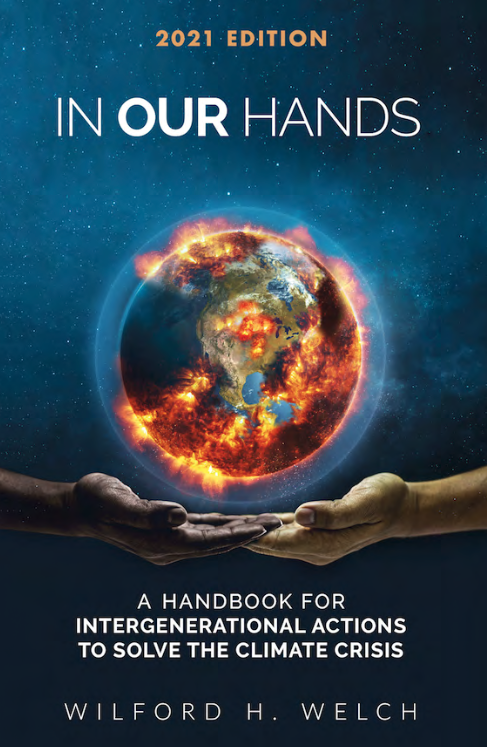“The greatest revolution of our generation is the discovery that human beings, by changing the inner attitudes of their minds, can change the outer aspects of their lives.”
-William James
Last April I participated in the Climate and Consciousness conference in Findhorn, Scotland. Since then, I have become engaged with groups exploring how the world can use the global climate crisis to awaken humanity to the destructive course it is on, and to transition humanity to a higher level of consciousness. These organizations have names such as A Social Movement for the Great Turning, Evolutionary Leap, The Great Transition, Climate Hope and Voyage into the Resonance Code.
While each group has its own particular focus, they also share many perspectives:
• Global warming and climate change will soon lead to global chaos if it is not effectively addressed by all of us.
• Many of the assumptions held and the actions taken in the modern world’s pursuit of economic growth and consumption have inadvertently led to this crisis.
• The crisis is an opportunity for humanity to examine these assumptions and to rethink our priorities.
• To achieve a transformation in consciousness and take the actions that are needed, we must reimagine our relationship with the natural world, with each other, and the role each of us needs to play. We must do this if we are to avert the worst results of the path we are on and move us to a higher level of consciousness. Stated otherwise, we need to learn how to live in harmony with the natural world and each other.
I believe that the following three deeply embedded assumptions of the modern world have led us to the brink of chaos. These assumptions now need to be re-examined:
That we can use the earth’s resources without consequence.
Humans seem to be the only animal, or indeed living thing, that consumes more than it needs to survive and procreate. We have assumed that we can take from mother earth to satisfy not only our needs, but also our wants, all without consequence.
In 1945, at the end of World War II, the number of humans inhabiting earth was 2.3 billion, and the earth’s resources appeared limitless. Now there are 7.7 billion of us and we are extracting far more of the world’s natural resources than the earth can resupply, particularly fresh water and agricultural land. The notion that “more is better” may or may not be true, but it is clearly no longer sustainable if all of us are to survive. Mother nature will soon show us what happens to human beings and all other living things when they grow beyond her capacity to support such wants and needs.
That we can continue to pump CO2 into the atmosphere without consequence.
The extraction and use of petroleum and other fossil fuels has enabled us to produce many of the things most of the 7.7 billion of us want. As a result, we have polluted virtually all parts of the earth’s surface and atmosphere. Last year we pumped an estimated 30 billion more tons of CO2 into the first six-miles of atmosphere over our heads. Unless we can effectively drawdown that carbon it will remain trapped there, as if under a blanket, for years to come. As a result, the earth’s atmosphere continues to heat up and is causing increasingly severe changes in the earth’s climate.
That each person is an island.
In reality, we are all part of one living system of many parts that are all dependent upon each other for our collective survival.
For many years, I have had opportunities to explore the ways of indigenous peoples around the world. While each group is unique, I have observed that some indigenous cultures hold two values in particular that may help us in our quest to address global warming and climate change, and may help lead us to a higher level of human consciousness:
To live each day in balance with the natural world.
These cultures believe that they must steward the natural world that they depend upon for their survival. In the modern world’s drive for economic growth at all costs, we have come to assume that we can exploit the natural world without consequence.
To live each day in balance with others in the community.
While the shift in our attitudes towards the natural world and towards each other will help address the climate crisis, I believe it will also lead to a different and more meaningful form of well-being for those who embrace it. This is very different from the tendency to measure prosperity in terms of the material goods we possess and consume in our pursuit of happiness.
The Balinese have a Hindu phrase that acts as a guide for their daily behavior: “Tri Hitta Karana.” Loosely translated it means, “I will seek to live today in harmony with the natural world, with others in my community, and with myself. (In place of myself they often use the expression “spirit”).
Maxwell Williams, who is a high school senior and a friend of mine, has turned this notion into the illustration at the top of this blog. It is my hope that if it has meaning to you, you will use this image in any way you see fit. You may use it to remind yourself and indicate to others that you are part of a movement of people who seek to be in balance with the natural world, with others, and within yourself.
In addition, my colleague Nancy Margulies from the Evolutionary Leap Group, a part of Elders Climate Action, has produced the following illustration to reflect our recent discussions about this very same topic.


